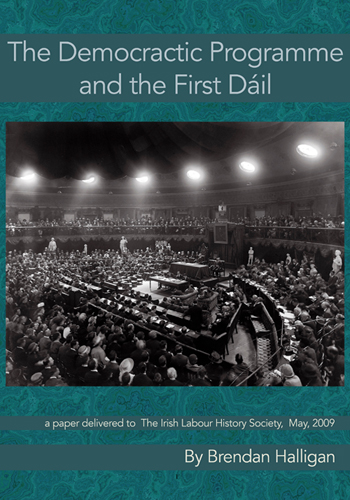WordPress database error: [You have an error in your SQL syntax; check the manual that corresponds to your MySQL server version for the right syntax to use near 'FROM wp_posts
WHERE 1=1 AND ((wp_posts.post_type = 'post' AND (wp_posts.' at line 2]SELECT SQL_CALC_FOUND_ROWS all
FROM wp_posts
WHERE 1=1 AND ((wp_posts.post_type = 'post' AND (wp_posts.post_status = 'publish')))
ORDER BY wp_posts.post_date DESC
LIMIT 0, 10
 The Democratic Programme and the First Dáil
The Democratic Programme and the First Dáil
By Brendan Halligan
This broad-reaching study entitled “The Democratic Programme and the First Dáil”, covers one of most fascinating developments in the early history of the Irish nation: the build up to the first Dáil’s drafting and adopting of their crucial “Democratic Programme” on 21 January 1919:
“The First Dáil, convened on 21 January 1919, is the subject of three myths, which have become received wisdom:
That the Labour Party, in an act of political cowardice, withdrew from the 1918 General Election as a result of pressure from Sinn Féin;
That by way of a sop to Labour, the Dáil adopted a democratic programme which weakly reflected the principles and philosophy of the party, and
That as a direct consequence of its refusal to contest the 1918 general election, the Labour Party suffered permanent electoral damage and condemned itself to being a minor political player.
Yet, simultaneously, the First Dáil is now mainly remembered for the “Democratic Programme” which was drafted by the Labour Party and quickly attained iconic status that has grown stronger over time. There is an obvious paradox here, which needs to be resolved. There are three points to make in setting the record straight.
First of all, the history of the period has been written by historians with little or no understanding of the Labour movement and, even less sympathy for its policies and leading personalities. Secondly, much of that history is pure propaganda. Thirdly, little of it indicates any understanding of political processes then in play, especially the interaction of the leading personalities in the independence movement.
Suffice it to say that each of the three propositions are false and in no way supported by the facts when examined in the light of contemporary records.
That said, the key to understanding the Democratic Programme lies in the period between the Rising and the General Election in December 1918. More importantly, it lies in understanding the role of three individuals occupying central positions in the Labour Party, namely, William O’Brien, Thomas Johnson and Cathal O’Shannon.
As for the period itself, it was one of the most tumultuous in history – in which events moved at astonishing speed. The dominant reality throughout those two years was the First World War, in particular the mass slaughter on the Western Front which was draining each belligerent of its man power.” …
By Brendan Halligan
A tribute to one of Ireland’s best known figures, Justin Keating.
Keating was a key figure in the new Labour Party created by Brendan Corish in the 1960s and served as Minister for Industry and Commerce in the National Coalition Government from 1973–77.
This tribute was written shortly after Justin’s death on 31 December, 2009:
“Justin Keating was a key figure in the new Labour Party created by Brendan Corish in the 1960s and served as Minister for Industry and Commerce in the National Coalition Government from 1973–77. A brilliant communicator, he was one of the best-known figures in public life for over four decades and was widely respected for the depth and breadth of his intellect.
Born in 1930 to Seán Keating, one of the most notable painters of his day, and May Walsh, a woman of strong republican beliefs, he was reared in the humanist tradition and attended secondary school in Sandford Park before studying Veterinary Science at UCD and University College London. He excelled as a Vzet and eventually became Dean of the Veterinary Science faculty in UCD and, towards the end of his career, the first Professor of Equine Science in the University of Limerick. A research scientist of note, he primarily regarded himself as a scientific rationalist and had the personality to go with it. Cool, rational and patient in debate, his forensic skills in assembling and deconstructing an argument were legendary and equipped him for the roles of teacher and politician.
He was one of a rare breed, an intellectual who took part in public life; not only that, but rose to become the Minister responsible for economic policy.
He came to public notice when he took leave of absence from TCD in 1965 to become Head of Agricultural Broadcasting in RTÉ, then beginning to find its feet as the national broadcaster. He devised and fronted “Telefís Feirme”, an agricultural education programme that became one of the most popular TV series due to his skills as a communicator. Within a year he had become a household name throughout the country and was one of the first TV personalities.” …